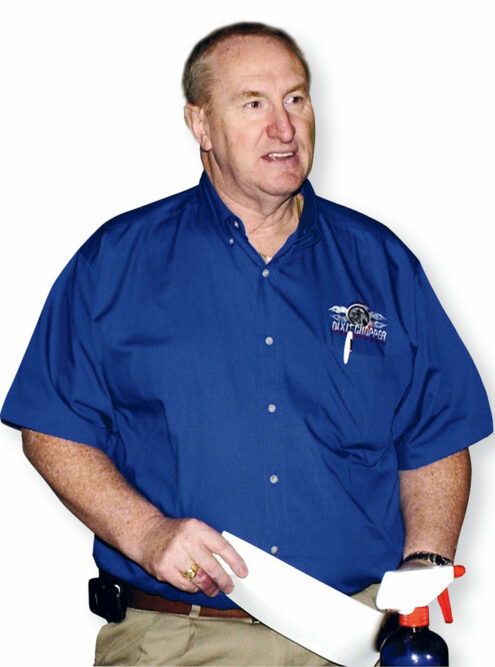Editor's Note: This article originally appeared in the Fall 2009 issue of Rural Lifestyle Dealer.
Moving Beyond Commercial Mowers
“Dixie Chopper is in the mid-mount mower business. We estimate that around 300,000 mid-mount mowers are sold annually in the U.S. Traditionally, most of our sales have been commercial mowers for landscapers and municipalities. This is where we’ve done very well over the years. We’re also developing a loyal following among large property owners — people with 5 acres or more. We’re looking to expand this segment and become more consumer-oriented with some new products we’ve introduced. We’ll be introducing others later this year, so our dealers will need to adapt. Our focus isn’t really changing because we’ve always aimed at the rural lifestyle-type customer, but now we’re doing a better job of getting to them.
“A couple of years ago, we introduced the Iron Eagle, which is our residential unit. I call it more of a ‘prosumer’ unit because it has a lot of the same features and benefits that our Silver Eagle and Xcaliber professional models do. It has a different engine and doesn’t go as fast as our commercial equipment. Otherwise, we’re not differentiating it by cheapening these mowers. But some of our dealers struggled with it because they’re used to selling to commercial cutters and didn’t know how to go about selling this type of product. Some just had their minds made up that they couldn’t sell them. But the dealers that have gotten on board have done a fantastic job of selling them. We sold out of most of those models by the middle of May. We’re very pleased with it.”
No Box Stores
“In terms of distribution, about 90% of dealers that handle Dixie Choppers specialize in the lawn and garden businesses and 10% are farm equipment dealers. We don’t necessarily have a preference between the two because we look at what’s best for each individual market. Our dealers must be able to service our equipment and customers. We haven’t done anything with the big box stores and have no plans to do anything with them or the mid-boxes like Tractor Supply Co. Art Evans, founder of our company has an expression: ‘Our product doesn’t come in a box, so you can’t buy it in a box.’ If they don’t have service capabilities, they can’t sell our equipment. The closest thing we’ve come to a chain is Theisen that has 9 locations throughout Iowa.”
Higher Dealer Standards
“We currently have about 540 dealers. We know that 60% of our business is being done by 40% of our dealers. We’re in the process of evaluating each one and seeing where things stand.
“We’re implementing programs to help our dealers improve and we’re making some recommendations on how they might do so. We’re here for the long run and we want our dealers to be here for the long run. We want them to properly represent Dixie Chopper. With time, we’ll be initiating standards that dealers will need to live up to if they’re going to sell our product.
New Products for 2010
“We’ll be introducing the Eco-Eagle, our new mower that runs on compressed natural gas. We recently finished testing it so we know it meets EPA and California Air Resource Board standards.
We’re also going to be the first in the industry to offer a 4-cylinder Caterpillar diesel engine on a zero-turn lawnmower. It’s the smoothest running engine out there as far as diesel engines go.
“We also have another model unveiled at the GIE Show, October 29-31 in Louisville. It will be between our Iron Eagle, which is our prosumer model, and our commercial machine. It is ideal for the rural lifestyler who doesn’t want a completely commercial machine, but it’s heavier duty than the Iron Eagle. It’s got a commercial engine on it and has a nice deck.
“We recently demonstrated a GPS-guided lawnmower. You mow with it once, and the next time you come back you push a button and it does exactly what it did the first time. The good news about it is it’s accurate to within half an inch.”
“We’re the manufacturer, but when the customer comes face-to-face with a Dixie Chopper product, he’s coming face-to-face with a dealer. It’s absolutely essential that our dealers are capable of handling whatever complaint or need our customers have. So we’re very concerned that the dealers understand how to get it done.
We’re in the process of putting together Dixie Chopper University that will be a technical service school held here at the factory. I struggle when technical training only involves PowerPoint presentations with nobody getting their hands dirty. We’ll supplement the factory training with videos that will be available on the Internet for our dealer service people. So when they run into a particular problem, they can go on the Internet and watch a video to show them how to resolve the issue.”
Opening a Company Store
“We’re in the process of opening our first factory store in upstate New York. We spent 6 months trying to find a dealer in the area to take on the product with no success. I’m very familiar with the area because that’s where my car dealership was. Besides the store, we’ll also have a parts warehouse there. It’s going to be a center of business for us.
“We’re going to see how this one gets up and running before making plans for any more, but Art Evans, has already given me his recommendation on where we should put the next one. My preference is not to have company stores, but I’m going to represent the product wherever I have to. If that’s what it takes, that’s what’s going to happen.”
As Good or Better Margins
“The number one characteristic we’re looking for in our dealers is a commitment to Dixie Chopper. That means that they’re not just out there selling our products as an afterthought, such as ‘Oh yeah. I’ve got this other brand, Dixie Chopper, if you want to look at it.’
“The best dealers understand that they’re not really competing against competitive brands of mowers. They’re competing for disposable dollars…” – Gary A. Morgan, President & CEO, Dixie Chopper, Coatesville, Ind.
“And there’s good reason that they should be committed to the brand. In a lot of cases, our larger dealers that sell tractors and more expensive equipment are finding they can make similar margins selling our mowers as they can selling the larger ticket items. One dealer told us, ‘I used to think that the $80,000 or $100,000 tractor was where all the money was. I’m finding that I can sell a Dixie Chopper and get as good or better margin and I don’t have to negotiate as hard as I do on a $100,000 tractor.’ They certainly don’t have as much money tied up in the entire process either.”
A Written Plan
“Our best-performing dealers have a written plan to look back on and refer to. They know where they want to go. They know what they’re trying to accomplish. They know how many lawnmowers they want to sell in the next 12 months and they know whether they’re meeting their own plan or not.
“They also know that the secret to selling this equipment is to getting the customers in the seat and letting them try the machine. One very good dealer personally follows a qualified prospect home to let them demo the mower on their own property. We’re working on some plans to make this easier for our dealers to do. Demonstrating the equipment is absolutely critical and something our best-performing dealers do routinely.”
Dealer Purity is Shortsighted
“I know from my days with New Holland what kind of pressure farm equipment dealers are under to not carry other brands at their stores. I believed then, and still believe now, that dealer purity is shortsighted on the part of the tractor makers. I believe that what’s good for the dealer is probably good for the manufacturer. If a dealer is getting the job done for us, I don’t care what else he sells. He can sell toasters as far as I’m concerned. A partnership needs to be good for everybody.”






Post a comment
Report Abusive Comment